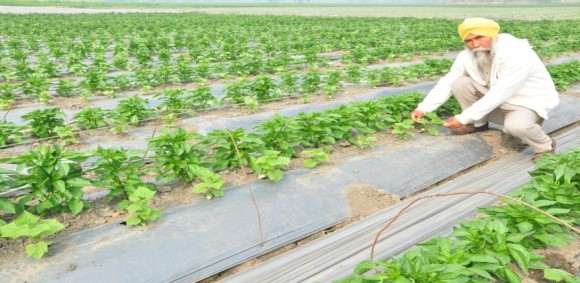Mulching, low tunnel technique are two ways to save vegetables from frost, cold

Experts of Punjab Agricultural University (PAU), Ludhiana have advised the vegetable growers to protect winter vegetables from frost injury.
PAU Vice Chancellor Satbir Singh Gosal said vegetable production was severely affected by various biotic and abiotic stresses. One such abiotic factor was frost, and that potato and summer season vegetables like cucurbits, chilli, tomato and brinjal were highly affected by frost, he said. Winter vegetables like cabbage, cauliflower, onion and garlic do not get much affected despite being sown in October-November, he added. Gosal urged the farmers to adopt PAU recommended techniques for better yield and to fetch higher prices in the market.
About various techniques developed to protect the crop from frost injury, PAU Department of Vegetable Science head Tarsem Singh Dhillon said that plastic mulch technology has various beneficial effects on crop production including protection from frost injury; increase in soil temperature; conservation of soil moisture, texture and fertility; and control of weeds, pests and diseases.
It also allows growing of crops early in the season and protects the plant from frost by conserving moisture and increasing the soil temperature near the plant’s surroundings, Dhillon said. “Plant covers are also very useful to protect plants from frost injury. It increases downward long-wave radiation at night and reduces convectional heat losses to the air. Commonly used material is removable straw coverings and polythene material,” he said.
PAU senior olericulturist Kulbir Singh said low tunnel technology was the most popular among vegetable growers. “These are made up of flexible transparent material to enclose rows of plants to promote their growth by increasing the temperature of air around the plant. This technique is used to raise summer season vegetable crops early in the season and this technique advances the crop by about one month than the normal season. Various vegetable crops like cucumber, capsicum and brinjal can be grown in low tunnel technology,” he said.
“Low tunnel technology is mainly used in December to February. In the starting of December, low tunnel is fixed on the beds where crops are raised to protect the crop from frost and in February, the plastic sheets are removed when the frost is over. This technology is affordable for small and marginal farmers. Nursery of chilli, capsicum and brinjal is sown in November and covered with low tunnel during December. The low tunnel will be removed during February when the frost period is over. With this technology, healthy nursery will be raised,” he advised.
PAU vegetable expert Dilpreet Talwar said another method to prevent frost injury that is of irrigation. “When the soils are dry, there are more air spaces, which inhibit heat transfer and storage. Frost protection is improved by wetting dry soils up to field capacity. Wetting the soil will often increase absorption of solar radiation. However, when the surface is wet, then evaporation is also increased and the energy losses to evaporation increase the temperature, protecting the crop from frost. Such method is used in potato.”
To read in Punjabi and Hindi, click below.
